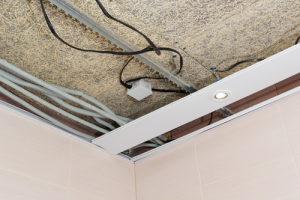“Aluminum is the most common metal in the earth’s crust, almost twice as abundant as iron. And one common class of aluminum minerals, collectively called alum, has been in use since at least Greek and Roman times.” – Sam Kean
The reason why I led this blog post with this quote is to really let you all know that aluminum has been around forever and will be around even longer. There are many misconceptions about aluminum and especially aluminum wiring that we would like to talk about. But there are also, some concerns that should also be discussed. In the end, we hope you’ll come to the conclusion that having aluminum wiring in your homes or commercial facilities is still a real option.
What is Aluminum Wiring?
Okay, let’s define what Aluminum wiring actually is. Wikipedia defines it as follows:
 “Is a type of electrical wiring for residential construction or houses that uses aluminum electrical conductors. Aluminum provides a better conductivity to weight ratio than copper, and therefore is also used for wiring power grids, including overhead power transmission lines and local power distribution lines, as well as for power wiring of some airplanes.”
“Is a type of electrical wiring for residential construction or houses that uses aluminum electrical conductors. Aluminum provides a better conductivity to weight ratio than copper, and therefore is also used for wiring power grids, including overhead power transmission lines and local power distribution lines, as well as for power wiring of some airplanes.”
So, What’s the problem?
The problems with aluminum wiring was at the start. When aluminum was given the okay back in the 1940’s it had some concerns, as do most new ideas. The causes for concern were that aluminum wiring was much softer than copper wiring. Aluminum wiring was unable to withstand some of the stress when it was being pulled, it was also subject to breaking if it was nicked and bent at radical angles, and it had to be at least one wire gauge larger than copper for each current rating.
The main problems were due to the metal on the screw terminals had caused oxidation, heating, expansion, and contraction, which made the terminals become loose on the receptacles and switches. That is primarily because aluminum expands and contracts at a different rate than copper, and the switches and receptacles were designed for copper’s rate of expansion and contraction.
So, what happened next?
When aluminum got the go ahead to be used for wiring installations over copper wiring, it was due in large part to aluminum being so cheap. It’s funny that aluminum was cheaper to use because history finds that the problems with aluminum wiring have to do with extremely cheap installation. According to inspectapedia.com: “Electrical devices (outlets, switches, lighting, fans, etc.) at the time were not designed with the properties of the aluminum wire being used in mind, and there were some issues related to the properties of the wire itself, making the installations with aluminum wire much more susceptible to problems.”
Is Aluminum wiring safe?
The answer to this question is yes. Aluminum wiring today, is being monitored and repaired all the time. In fact, it is still being used today on larger circuits that don’t require as many terminations to various devices. Many electrical contractors still use aluminum for feeders to panels and large appliances such as electric furnaces, and engineers still specify aluminum wiring on large feeders and branch circuits in buildings. These circuits are commonly terminated in disconnects and electrical panels with lugs that are rated and suitable for aluminum wiring.
What’s up Insurance?
Here we are now, we’ve shown that aluminum wiring isn’t a bad thing, unless you have a company installing it without the proper precautions. There are a few options for repairs to aluminum wiring, such as ‘Pig-Tailing.’ Pig-Tailing is a cable that has an appropriate connector on one end and loose wires on the other. It is designed to patch into an existing line or to terminate the ends of a long run. Another option is to remove all of the switches and receptacles in the residence and replace them with Co/Alr receptacles and switches which was equally expensive to do. The next option is what insurance companies want to have done. It’s a real long project for the customer, but one that can be done and is covered by most insurance companies.
Aluminum Wiring
I hope we’ve brought some light to the suspicions that aluminum and aluminum wiring is the culprit for so many problems. Instead, it’s due to faulty installation, incompatible materials, and lack of maintenance. Today, it’s also due to most homes not being up to code with proper smoke detectors that are a combination of AC and battery back up which are located in proper locations in your residences or businesses.
Not having all safety precautions met back in the day are the reasons why aluminum has gotten such a bad rap. We would love to help with your aluminum wiring questions and concerns. Please email us, or call us to start the conversation.

